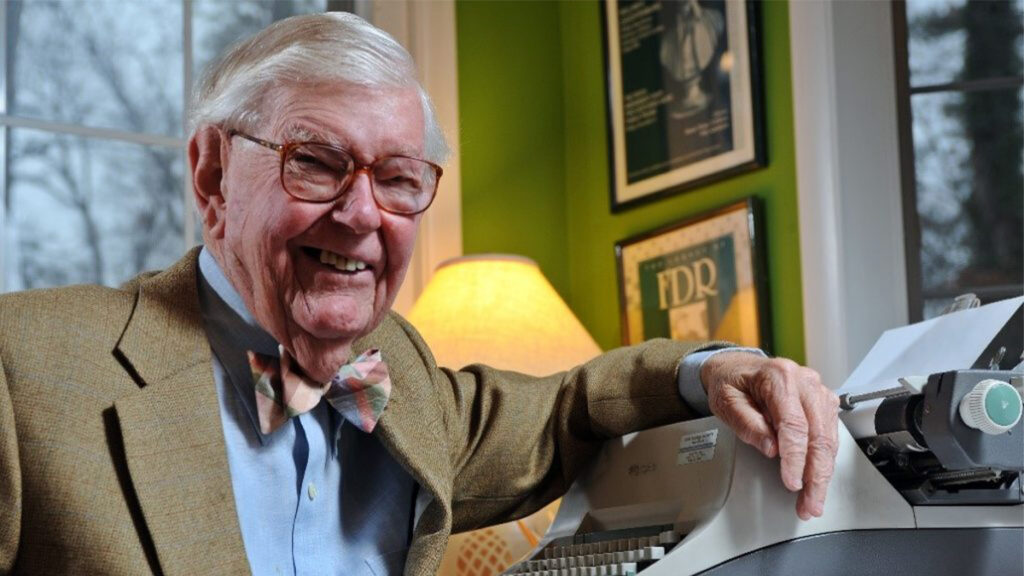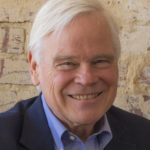UNC-Chapel Hill Professor Emeritus William Leuchtenburg died on January 28. He was born on September 28, 1922.
He and his wife Jean Anne were popular on their wooded Chapel Hill lot where they made friends with their neighbors and the nearby wildlife.
Leuchtenburg earned his BA from Cornell and his PhD in History in 1951 from Columbia, where he taught before joining the history department at UNC-Chapel Hill in 1982.
Last year, Oxford University Press released his latest and final book, “Patriot Presidents: From George Washington to John Quincy Adams.” In “Patriot Presidents,” Leuchtenburg, with the help of his spouse, editor and writing partner, Jean Anne Leuchtenburg, set out to narrate and explain the record of the first six presidents, George Washington, John Adams, Thomas Jefferson, James Madison, James Monroe, and John Quincy Adams, our founding fathers.

After teaching at UNC-Chapel Hill from 1982–2002, Leuchtenburg retired as the William Rand Kenan Jr. Distinguished Professor. He continued to serve on the UNC Press Board of Governors and perform other service for the University. (Dan Sears/UNC-Chapel Hill)
According to the history department, Leuchtenburg became a leading scholar of 20th century U.S. history and the American presidency and the preeminent expert on FDR, writing profoundly influential books including “The Perils of Prosperity, 1914–32” (1958).
His “Franklin D. Roosevelt and the New Deal, 1932-1940” (1963) won the prestigious Bancroft Prize and the Francis Parkman Prize. Sixty years later, it remains the best single volume treatment of the subject.
His later publications have constantly enhanced his historical influence and stature.
Ten years ago, in “The American President: From Teddy Roosevelt to Bill Clinton” Leuchtenburg described the expansion of presidential power during the 20th century, showing how it grew in periods of reform to respond to domestic challenges and during the two World Wars, Korea, Vietnam, and the war on terror.
Reviewing that book in “The American Scholar,” Michael Sherry wrote that Leuchtenburg “is perhaps today’s greatest presidential historian, and not of the presidency as some insular realm, but as it intersected with national life, which makes this book also a history of the nation in the 20th century.”
Filmmaker Ken Burns, himself a great storyteller, explained his friend Leuchtenburg’s gift for writing history. “This is a riveting narrative, written by someone with a deep knowledge of the presidents and our complicated country. It seems an almost effortless work, but, of course, it’s not. William Leuchtenburg has spent the better part of a century studying the mechanics of this republic and the men (so far) charged with leading it. The result here is a fast-paced, dramatic literary achievement that will be around and used for centuries.”
UNC history professor Lloyd Kramer said in the university’s obituary, “What was striking about Bill Leuchtenburg was that he believed history is an essential part of our democratic culture, democratic society, and his commitment to democracy, to public life, took the form of deep engagement with historical knowledge,” Kramer, also a friend of Leuchtenburg, said. “He wanted people to understand that historical knowledge is essential for a democratic public life.”
According to the department, Leuchtenburg became a leading scholar of 20th century U.S. history and the American presidency and the preeminent expert on FDR, writing profoundly influential books including “The Perils of Prosperity, 1914–32” (1958).
His “Franklin D. Roosevelt and the New Deal, 1932-1940” (1963) won the prestigious Bancroft Prize and the Francis Parkman Prize. Sixty years later, it remains the best single volume treatment of the subject.
His later publications have constantly enhanced his historical influence and stature. These works include “In the Shadow of FDR: From Harry Truman to Ronald Reagan” (updated and subtitled From Harry Truman to Barack Obama, 2009); “The Supreme Court Reborn: The Constitutional Revolution in the Age of Roosevelt” (1996); “The FDR Years: On Roosevelt and His Legacy (1997); The White House Looks South: Franklin D. Roosevelt, Harry S. Truman, Lyndon B. Johnson” (2005); and “The American President: From Teddy Roosevelt to Bill Clinton (2015).”
Filmmaker Ken Burns, himself a great storyteller, explains Leuchtenburg’s gift.
Central to Leuchtenburg’s writing and teaching was an underlying theme of the importance of history to American democracy,
UNC history professor Lloyd Kramer said in the university’s obituary. “What was striking about Bill Leuchtenburg was that he believed history is an essential part of our democratic culture, democratic society, and his commitment to democracy, to public life, took the form of deep engagement with historical knowledge,” Kramer, also a friend of Leuchtenburg, said. “He wanted people to understand that historical knowledge is essential for a democratic public life.”
 D.G. Martin, a lawyer, retired as UNC system vice president for public affairs in 1997. He hosted PBC-NC’s “North Carolina Bookwatch,” for more than 20 years.
D.G. Martin, a lawyer, retired as UNC system vice president for public affairs in 1997. He hosted PBC-NC’s “North Carolina Bookwatch,” for more than 20 years.
Chapelboro.com does not charge subscription fees, and you can directly support our efforts in local journalism here. Want more of what you see on Chapelboro? Let us bring free local news and community information to you by signing up for our newsletter.

